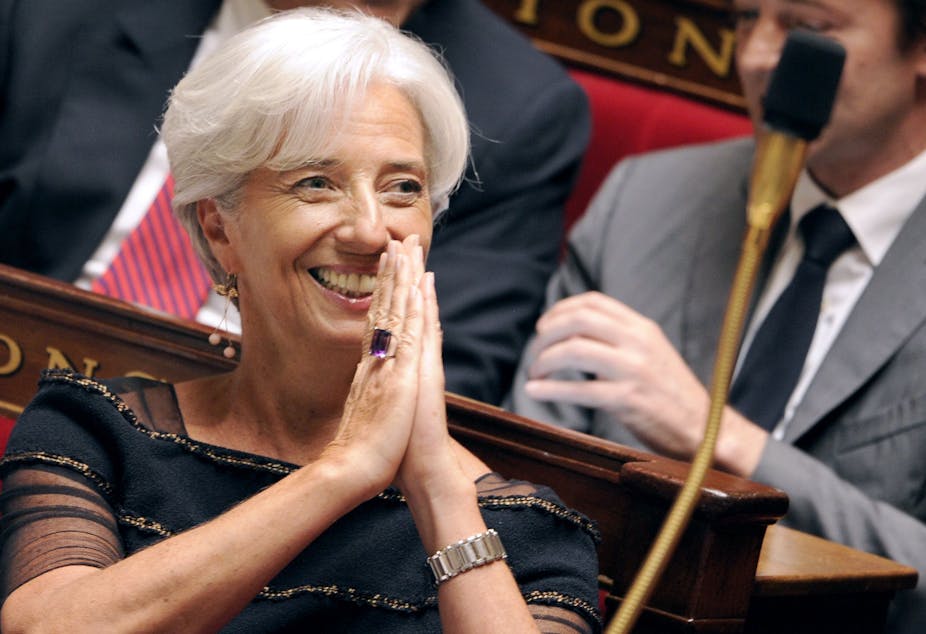Quelle surprise. French finance minister Christine Lagarde has been announced as the new managing director of the IMF, succeeding the beleaguered Dominique Strauss-Kahn.
Like Strauss-Khan (known as ‘DSK’), Lagarde is a lawyer, although her political vita, accumulated exclusively under the Gaullist presidencies of Jacques Chirac and Nicolas Sarkozy, is populated heavily with economics and finance portfolios.
What is perhaps more interesting about Lagarde is not that she is the first woman to occupy the top job at the Fund, but that she is a transatlanticist through and through.
She spent two decades in the US, with her career including a stint in a US congressman’s office. She was also the first female director at consultants Baker & McKenzie.
In this respect, like Sarkozy, she breaks the mould of the archetypal French politician: she is not an énarque (a graduate of the prestigious École nationale d’administration), which is the usual route to success in French politics and administration. Strauss-Kahn is an énarque.
So was Jacques de Larosière, a former Bank of France governor who ran the Fund from 1978 until 1987. Another énarque was Michel Camdessus, (IMF chief from 1987–2000), whose visage loomed ominously over Suharto in an infamous photo, when the Indonesian president swallowed the harsh medicine prescribed by the Fund following the 1997 Asian financial crisis.
Even prior to his election in 2007, Nicolas Sarkozy was known as “an American with a French passport”, who befriended both Bush and Obama.
Unlike his mentor and predecessor, Chirac, Sarkozy has supported and promoted transatlanticists in his administration, including Lagarde.
Consequently, Lagarde’s appointment ruffled no feathers in Washington (the real power behind the IMF throne). DSK, too, was respected throughout the globe’s financial capitals, and many IMF and World Bank insiders privately declared they were sorry to see him go.
Charismatic, well-regarded and a deal-maker, DSK presided over a raft of IMF rescues during the global financial crisis.
But he was critical of the lack of regulation in the international financial sector and, in a nod to his former life as a French Communist and Socialist deputy, he castigated the greed of the bankers, and ruminated that the poor would bear the brunt of the costs of the enormous financial bailouts.
Plus ça change…
Why has another French lawyer cum finance minister been appointed to the top job at the Fund?
A little history is required: first, the managing director’s job at the IMF, despite being headquartered in Washington, is French to the fingertips. Or almost. Aside from the occasional German and the odd Spaniard, it is virtually a lay-down misère that the MD will be a French appointee. Mexicans – like Lagarde’s erstwhile-and-well-qualified-competitor, Agustin Carstens – need not apply.
Nor Anglo-Saxons, for that matter. Peter Costello, trumpeted briefly by Australian political and media elites, didn’t even get to the starting line.
Money is politics
The managing directorship of the IMF was decided in 1944 at the Bretton Woods conference, where John Maynard Keynes complained bitterly (as he had in 1919 at Versailles) that nobody ever listened to him.
Even before the Allies defeated Nazi Germany, the die was cast: the Europeans would appoint IMF chiefs; the Americans claimed ownership of the World Bank; and everyone else could fight over who ran the abortive International Trade Organisation (the World Trade Organization is the ITO’s spiritual successor).
Together, the IMF, World Bank and WTO form the ‘holy trinity’ of international economic organisations. They are institutions where European, American and Japanese influence run deep. And, as someone once remarked unkindly, they are also clubs filled with former world powers.
There are few parts of the globe today where Chinese influence is not felt; the IMF is one of them. Jointly, the US, Japan, Germany, France and Britain (the so-called ‘G5’) control 40% of the votes. The voting situation is similar in the World Bank, where the US is a ‘veto player’ and the G5 effectively determines Bank policy.
Saving the PIIGS
Lagarde faces a stern first test as IMF chief: ensuring Greece, which voted narrowly to accept austerity reforms, does not become a mill stone around the EU’s neck.
She was originally opposed to IMF involvement in the Greek bailout, and ensured that the EU assumed the largest proportion of the package,which needed the support of Sarkozy and German Chancellor Angela Merkel.
French banks have the largest exposure to Greek debt, while Germany remains Europe’s paymaster. But Greece is likely to need another €110 billion simply to keep it afloat.
Moreover, potential sovereign debt defaults amongst the PIIGS (Portugal, Ireland, Italy, Greece and Spain) remain a pressing and escalating problem for the IMF. Greece, Ireland and Portugal have already undergone crisis bailouts. Spain and Italy may be next.
There is a common misconception that the IMF exists to prescribe harsh remedies for emerging economies in the form of structural adjustment programs. It doesn’t. The IMF’s raison d’être is to rescue rich countries from their own imprudence and profligacy.
For Lagarde, the challenge lies in balancing the IMF’s demands for fiscal austerity and discipline with the EU’s need for Eurozone stability.
The first step is to restore confidence in the euro by implementing serious structural adjustment in the EU’s southern periphery. The PIIGS might not fly, but at least their snouts would be out of the trough.

